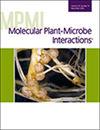Mathilde Vincent, Hasna Boubakri, Pascale Fournier, Nicolas Parisot, Pierre Pétriacq, Cédric Cassan, Amélie Flandin, Guylaine Miotello, Jean Armengaud, Anne-Emmanuelle Hay, Aude Herrera-Belaroussi
求助PDF
{"title":"<i>Phytophthora alni</i> Infection Reinforces the Defense Reactions in <i>Alnus glutinosa</i>-<i>Frankia</i> Roots to the Detriment of Nodules.","authors":"Mathilde Vincent, Hasna Boubakri, Pascale Fournier, Nicolas Parisot, Pierre Pétriacq, Cédric Cassan, Amélie Flandin, Guylaine Miotello, Jean Armengaud, Anne-Emmanuelle Hay, Aude Herrera-Belaroussi","doi":"10.1094/MPMI-12-24-0160-R","DOIUrl":null,"url":null,"abstract":"<p><p><i>Alnus glutinosa</i>, able to establish symbiosis with mutualistic bacteria of the genus <i>Frankia</i>, is one of the main species in European riparian environments, where it performs numerous biological and socioeconomic functions. However, riparian ecosystems face a growing threat from <i>Phytophthora alni</i>, a highly aggressive waterborne pathogen causing severe dieback in <i>A. glutinosa</i>. To date, the tripartite interaction between the host plant, the symbiont <i>Frankia</i>, and the pathogen remains unexplored but is critical for understanding how pathogen-induced stress influences the nodule molecular machinery and thus the host-symbiont metabolism. In the present study, we aimed to explore for the first time how <i>P. alni</i> affects the overall molecular processes of <i>Alnus glutinosa-Frankia</i> nodules, with a special focus on unraveling the spatial expression of defense mechanisms within these tissues. We conducted a laboratory experiment based on <i>P. alni</i> infection of young <i>A. glutinosa</i> seedlings nodulated with <i>Frankia alni</i> ACN14a, noninfected or infected with the pathogen <i>P. alni</i>. Multi-omics analyses (i.e., transcriptomics, proteomics, and metabolomics) were carried out on nodules (N) and associated roots (AR) of the same plant to underline the impact on the nodule molecular processes (i.e., N/AR markers) when the host plant is infected compared with noninfected plants. Our results revealed that <i>P. alni</i> infection modified the molecular nodule processes and induced reprograming of defense-related markers by a shift in associated roots to the detriment of nodules. These findings suggest that <i>A. glutinosa</i> reinforces locally its immune responses in roots but moderates this activation in nodules to preserve its <i>Frankia</i> symbiont. [Formula: see text] Copyright © 2025 The Author(s). This is an open access article distributed under the CC BY-NC-ND 4.0 International license.</p>","PeriodicalId":19009,"journal":{"name":"Molecular Plant-microbe Interactions","volume":" ","pages":"463-478"},"PeriodicalIF":3.4000,"publicationDate":"2025-05-01","publicationTypes":"Journal Article","fieldsOfStudy":null,"isOpenAccess":false,"openAccessPdf":"","citationCount":"0","resultStr":null,"platform":"Semanticscholar","paperid":null,"PeriodicalName":"Molecular Plant-microbe Interactions","FirstCategoryId":"99","ListUrlMain":"https://doi.org/10.1094/MPMI-12-24-0160-R","RegionNum":3,"RegionCategory":"生物学","ArticlePicture":[],"TitleCN":null,"AbstractTextCN":null,"PMCID":null,"EPubDate":"2025/6/13 0:00:00","PubModel":"Epub","JCR":"Q2","JCRName":"BIOCHEMISTRY & MOLECULAR BIOLOGY","Score":null,"Total":0}
引用次数: 0
引用
批量引用
Abstract
Alnus glutinosa , able to establish symbiosis with mutualistic bacteria of the genus Frankia , is one of the main species in European riparian environments, where it performs numerous biological and socioeconomic functions. However, riparian ecosystems face a growing threat from Phytophthora alni , a highly aggressive waterborne pathogen causing severe dieback in A. glutinosa . To date, the tripartite interaction between the host plant, the symbiont Frankia , and the pathogen remains unexplored but is critical for understanding how pathogen-induced stress influences the nodule molecular machinery and thus the host-symbiont metabolism. In the present study, we aimed to explore for the first time how P. alni affects the overall molecular processes of Alnus glutinosa-Frankia nodules, with a special focus on unraveling the spatial expression of defense mechanisms within these tissues. We conducted a laboratory experiment based on P. alni infection of young A. glutinosa seedlings nodulated with Frankia alni ACN14a, noninfected or infected with the pathogen P. alni . Multi-omics analyses (i.e., transcriptomics, proteomics, and metabolomics) were carried out on nodules (N) and associated roots (AR) of the same plant to underline the impact on the nodule molecular processes (i.e., N/AR markers) when the host plant is infected compared with noninfected plants. Our results revealed that P. alni infection modified the molecular nodule processes and induced reprograming of defense-related markers by a shift in associated roots to the detriment of nodules. These findings suggest that A. glutinosa reinforces locally its immune responses in roots but moderates this activation in nodules to preserve its Frankia symbiont. [Formula: see text] Copyright © 2025 The Author(s). This is an open access article distributed under the CC BY-NC-ND 4.0 International license.
真菌疫霉侵染增强了法兰克桤木根系的防御反应,不利于根瘤生长。
Alnus glutinosa能够与Frankia属的共生细菌建立共生关系,是欧洲河岸环境中的主要物种之一,在那里它具有许多生物和社会经济功能。然而,河岸生态系统面临着来自疫霉(Phytophthora alni)的日益严重的威胁,这是一种高度侵袭性的水生病原体,可导致谷草枯死。迄今为止,寄主植物、共生体Frankia和病原体之间的三方相互作用尚未被探索,但对于理解病原体诱导的胁迫如何影响根瘤分子机制等寄主-共生体代谢至关重要。在本研究中,我们旨在首次探索P. alni如何影响Alnus glutinosa - Frankia结节的整体分子过程,并特别关注揭示这些组织内防御机制的空间表达。本研究以alfrania alni ACN14a结瘤的a . glutinosa幼苗、未感染和感染P. alni为研究对象,进行了P. alni侵染的室内实验。对同一株植物的根瘤(N)和相关根(AR)进行了多组学分析,以强调与未感染植物相比,寄主植物受到感染时对根瘤分子过程(即N/AR标记)的影响。我们的研究结果表明,P. alni感染改变了分子结核过程,并通过相关根的转移诱导防御相关标记的重编程,从而损害了结核。这些发现表明,粘多糖在根中增强了局部免疫反应,但在根瘤中调节了这种激活,以保存其Frankia共生体。
本文章由计算机程序翻译,如有差异,请以英文原文为准。

 求助内容:
求助内容: 应助结果提醒方式:
应助结果提醒方式:


